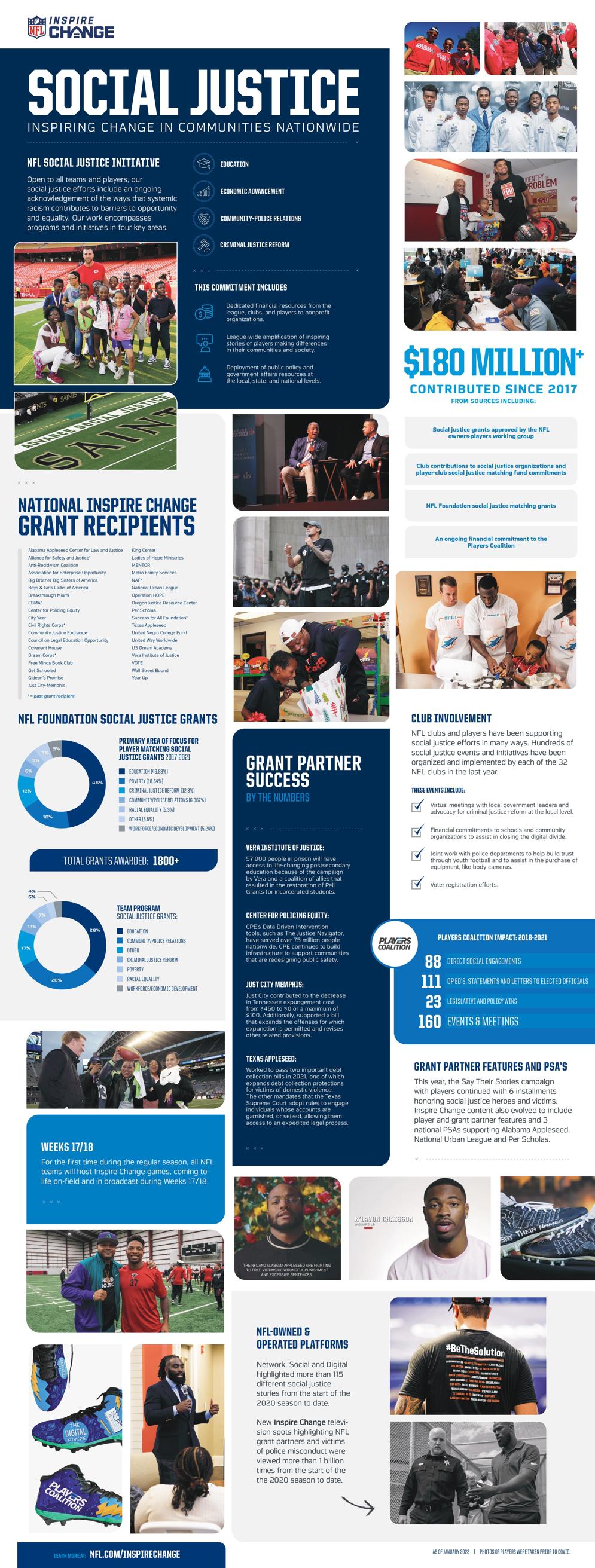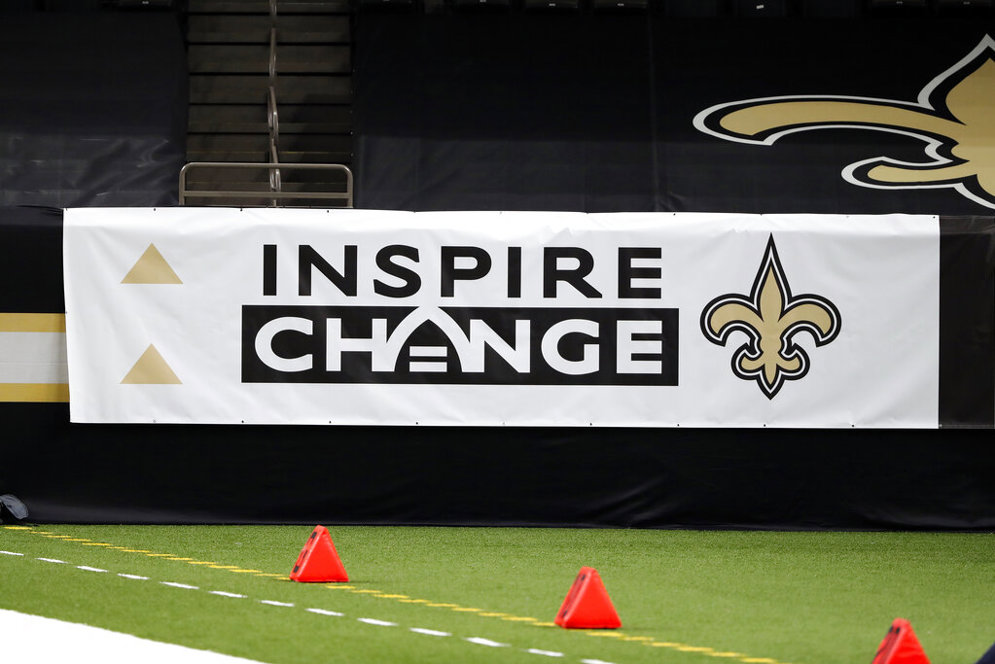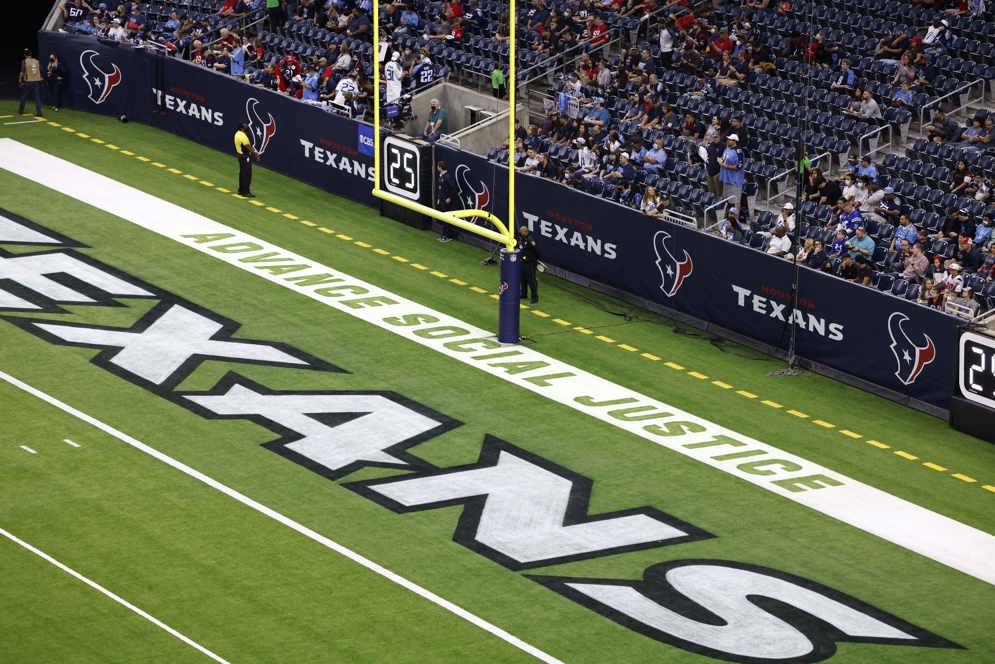The NFL’s Inspire Change initiative showcases how players, owners and the league work together to create positive change in communities across America.

Through Inspire Change, the NFL supports player-led efforts to engage with team owners, public officials, law enforcement, academic institutions, community partners and others to identify meaningful ways to strengthen local communities and the greater society.
Working with the Players Coalition, an independent 501(c)(3) entity, NFL teams and the league continue to support programs and initiatives that reduce barriers to opportunity.
During the 2017 season, the NFL formed a joint player-owner committee focused on social justice. The committee includes club owners Gayle Benson (New Orleans Saints), Michael Bidwill (Arizona Cardinals), Arthur Blank (Atlanta Falcons), Jimmy Haslam (Cleveland Browns), and Shahid Khan (Jacksonville Jaguars).The player representatives include Cardinals offensive tackle Kelvin Beachum, Texans quarterback Josh McCown, Bills cornerback Josh Norman, and NFL Legends Anquan Boldin and Aeneas Williams.
Inspire Change focuses on four priority areas:
- Education
- Economic advancement
- Police & community relations
- Criminal justice reform
Since the launch of the league’s social justice initiative, more than $300 million in grants have been awarded to social justice organizations as part of the NFL's Inspire Change initiative. The expanded partnership builds on the NFL's social justice grants, which have supported more than 650 local non-profits, 1,950 player and Legend matching grants, and more than 40 national grant partners.
Also included in the Inspire Change contribution are the club-player matching social justice funds. Adopted in 2018 by all 32 NFL clubs, this initiative encourages clubs to match the contributions of their players and work collaboratively to support local social justice organizations.
In 2020, the league announced an extended commitment of $250 million over a 10-year period to help advance social justice.
In 2022, the Player-Owner Social Justice Working Group renewed its commitment to address the "digital divide," a longstanding barrier to internet and technology access in the U.S. exacerbated due to the COVID-19 pandemic and disproportionately impacting communities of color. Specifically, the working group approved an additional $480,000 in funding allocated to NFL clubs — $15,000 per club — to further their work with local nonprofits to help alleviate the "digital divide" in areas that need it most.
Hear how the NFL and its players, clubs, and partners address social injustice across the country.
SOCIAL JUSTICE GRANT Recipients
Alabama Appleseed Center for Law & Justice: Alabama Appleseed documents and confronts drivers of poverty and inequity within Alabama's criminal punishment system, creates coalitions to identify and move evidence-based solutions, and changes systems through legislative action.
Alliance for Safety and Justice: Alliance for Safety and Justice is a national organization that aims to win new safety priorities in states by reducing incarceration and barriers for people living with a past conviction, advancing policies that help communities most harmed by crime and violence, and expanding constituencies and support for justice reform. (Former SJ partner)
Anti-Recidivism Coalition: ARC advocates for transformational criminal justice reform, empowers people to achieve their dreams, and supports people as they make their way back into society.
Association for Enterprise Opportunity: AEO utilizes its funding to support the "RESILI" program designed to provide strategy and developmental assistance to local Black owned businesses and target the wealth gap that exists between Black and white American families.

Big Brothers Big Sisters of America: Big Brothers Big Sisters of America supports 240+ agencies across the country as they create long-term, one-to-one mentoring relationships that empower youth to reach their full potential. The BBBSA mentoring model is a proven, long-term strategy for bridging gaps in academics and income while connecting communities across racial and economic divides.
Boys & Girls Clubs of America: Boys & Girls Clubs of America will use the funding to support its Youth for Change Town Hall and the creation of the TLC Youth Advocacy process, an effort to further educate 5,000 teens and build advocacy capacity via service-learning projects. The organization will also train 32 staff members on leading Wellness Mentoring Circles to address topics related to culture, history and customs in the context of community.
Breakthrough Miami: Breakthrough Miami will focus its grant to advance the Changemaker Leadership Track supporting current Breakthrough Scholars and recent alumni to build capacities to challenge the digital divide, gain early work experience, college advising, financial literacy and leadership development.
Campaign for Black Male Achievement: The CBMA is a national membership network that seeks to ensure the growth, sustainability, and impact of leaders and organizations committed to improving the life outcomes of Black men and boys. (Former SJ partner)
Center for Policing Equity: The CPE works with communities and inside of public safety systems to make law enforcement less racist and less deadly. Using data-driven approaches to social justice, CPE uses science to create levers for social, cultural, and policy change. CPE empowers vulnerable communities to engage with and shape their public safety systems. By right-sizing and right-purposing policing, CPE seeks to build public safety systems that are just, equitable, and non-racist.
City Year: City Year helps students and schools succeed. Fueled by national service, City Year AmeriCorps members serve in schools all day, every day as student success coaches, preparing students with the skills and mindsets to thrive and contribute to their community.
Civil Rights Corps: Civil Rights Corps are leaders in landmark litigation and high-impact advocacy that empowers communities to change the unjust legal system. (Former SJ partner)
Community Justice Exchange: Community Justice Exchange is a national hub that provides support to community-based organizations that are building a new vision of community justice through bottom-up interventions in the criminal, legal, and immigration detention systems.
Council on Legal Education Opportunity, Inc. (CLEO): For more than 50 years, CLEO has worked to bring greater diversity to the legal profession by fulfilling its mission to “inspire, motivate, and prepare students from underrepresented communities to succeed in law school and beyond.”
Covenant House: Covenant House will strengthen its workforce development and education services across the U.S., providing support specifically designed to meet the needs of youth and young families facing homelessness.
Dream Corps: Dream Corps closes prison doors and opens doors of opportunity. We bring people together across racial, social, and partisan lines to create a future with freedom and dignity for all.
Free Minds Book Club & Writing Workshop: Free Minds Book Club & Writing Workshop works with incarcerated and formerly incarcerated youth and adults, using the literary arts, workforce development, trauma healing, and advocacy to create personal and societal change. The grant will support the expansion of FMBC's re-entry programming during a time of increased need.
Get Schooled: Get Schooled uses digital programming to help underserved youth access first-time jobs and college while providing the resources to succeed. Existing Inspire Change grant partners who work specifically with college-aged youth will have the opportunity to partner with Get Schooled to bring their digital content and programming to those communities.
Gideon’s Promise: Gideon’s Promise is building a public defender movement to amplify the voice of impacted communities and transform criminal justice.
Just City-Memphis: Just City-Memphis will use funding to support the Memphis Community Bail Fund, the Clean Slate Fund, and Court Watch programs. Memphis Bail Fund has freed more than 500 people from pretrial detention, while the Clean Slate Fund helps people navigate the complicated process of expungement. Court Watch trains and places volunteers in courts to observe – targeting the disproportionate impact the system has on people of color.

King Center: The Martin Luther King, Jr. Center for Social Change (“The King Center”) serves as a resource dedicated to educating individuals and organizations in utilizing the strategies and methods of nonviolence as taught by Dr. Martin Luther King, Jr., to create a more just, humane and peaceful world.
Ladies of Hope Ministries: The LOHM will use the grant to support its Faces of Women Imprisoned Speakers Bureau, Parole and Probation Accountability Project, and EPIC Ambassadors policy advocacy project. Through its #RewritingHerStory series, the LOHM changes the narrative about women and girls who are directly affected by the criminal justice system and transforms policies and practices that limit opportunities and exacerbate a cycle of poverty, trauma, harm, and incarceration. National ambassadors work directly with policymakers to address probation restrictions, and police and community relations.
MENTOR: MENTOR will increase its resources and tools on virtual mentoring made available to mentoring programs nationwide. The organization will continue to recruit and train people, schools, and employers to bolster youth mentoring, advocate, organize, and advise government to create policies that integrate mentoring, and provide research and training on mentoring best practices through their local affiliates and the overall intersection of social, racial, and economic equity and supportive relationships.
Metro Family Services: Metropolitan Family Services empowers families to learn, to earn, to heal and to thrive. Part-mentor, part-motivator, and part-advocate, Metropolitan has provided essential human services since 1857 and been an engine of change that empowers Chicago-area families to reach their potential and positively impact their communities.
NAF: NAF solves some of the biggest challenges facing education and the workforce by bringing education, business, and community leaders together to transform the high school experience for students in underserved communities nationwide.
National Urban League: The National Urban League is a civil rights and urban advocacy organization with 90 affiliates serving 300 communities, providing direct services that impact and improve the lives of nearly 2 million people nationwide. The League promotes economic empowerment through education and job training, housing and community development, workforce development, entrepreneurship, health, and quality of life.
Operation HOPE: Operation HOPE is a nonprofit, for-purpose organization working to disrupt poverty and empower economic inclusion for low- and moderate-income youth and adults.
Oregon Justice Resource Center: OJRC will use its funding to support the Women's Justice Project – the first and only program in Oregon that addresses the needs of women in the criminal justice system. The program provides direct legal services, public awareness campaigns, and advocacy coordination.
Per Scholas: Per Scholas will enroll 220 new individuals into their Software Engineering courses – a 15-week, full-time training program that will include technical instruction and professional development in efforts to advance economic equity.
Success for All Foundation: The mission of the Success for All Foundation is to develop and disseminate research-proven educational approaches to ensure that all students from all backgrounds achieve success in school.
Texas Appleseed: Texas Appleseed will use its funding to support the organization's work in three areas that that disproportionately affect Black and Latinx Texans from low-income backgrounds: driver's license suspensions, criminal record expungement, and debt collection.

United Negro College Fund: UNCF envisions a nation where all Americans have equal access to a college education that prepares them for rich intellectual lives, competitive and fulfilling careers, engaged citizenship and service to our nation. UNCF works to build a pipeline of under-represented students who become highly-qualified college graduates, and to ensure its network of 37-member HBCU institutions is a model of best practices in moving students to and through college.
United Way Worldwide: United Way Worldwide will put the funding toward the Young Men United initiative, a national platform which aims to support 25,000 young men of color in the United States to and through post-secondary and into entry level career positions. United Way Worldwide and local United Ways will provide mentorships, internships, college and career readiness supports, and need-based funding to support each student, over the course of six years, beginning in junior year of high school and continuing through college graduation.
US Dream Academy: US Dream Academy will use its funding to aid in the continuation of the Children of Incarcerated Parents initiative, providing mentorship, leadership training, educational support and career readiness for a unique population of primarily Black and Latinx young people in communities harmed by racial bias and mass incarceration.
Vera Institute of Justice: The Vera Institute of Justice is a justice reform change agent studying problems, testing solutions, harnessing the power of evidence, and driving public debate to urgently build justice systems that ensure fairness, promote safety, and strengthen communities.
VOTE: VOTE is a grassroots organization founded and run by formerly incarcerated people (FIP), and their families and allies. They are dedicated to restoring the full human and civil rights of those most impacted by the criminal justice system and to improve public safety in Louisiana and beyond without relying on mass incarceration.
Wall Street Bound: Wall Street Bound provides diverse college students with the skills, experience, and social capital needed to access and succeed in financial services careers. The NFL's social justice grant funding will support WSB's work to provide scholars, largely from underserved communities, with finance technical and soft skills training, and social capital via their flagship program, “Wall Street Direct” and “Introduction to Wall Street” customized Bootcamps. Their goal is to reach 200 students with programming in 2023, with a job placement goal of 80% or higher.
Year Up: Year Up connects young adults, 90% of whom identify as people of color, to livable wage careers at hundreds of top companies and has shown the highest wage gains of any workforce development program. The NFL's social justice grant funding will support Year Up's mission to close the Opportunity Divide and champion economic justice with its direct service workforce development programming.
In addition to these grants, the NFL funds EverFi’s 306: African-American History digital curriculum in 300 schools nationwide. The course for high schoolers, many of whom previously had African American history removed from their school curricula, brings to life leaders and events that changed the fabric of America. The course covers four key eras and allows students to take control of their journey as they learn at their own pace. After taking 306, students show an improvement in their knowledge of civil rights and an increased sense of their civic duty.


